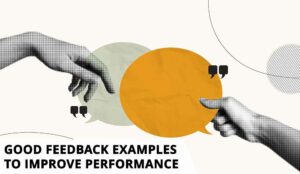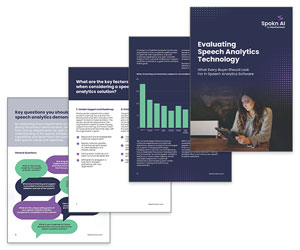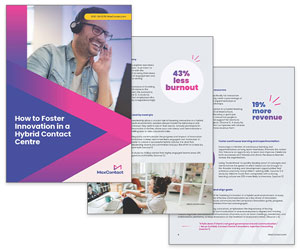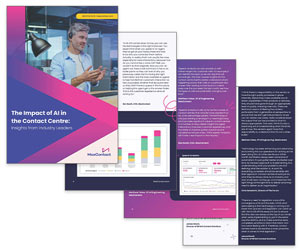As the main or only point of contact with many customers, contact centre performance fundamentally drives the business bottom line. That’s perhaps more true than ever during the Covid pandemic when contact centres have become the only point of contact with customers for the majority of organisations.
So if contact centres drive business performance, how do you make sure yours is working as effectively as it can? MaxContact’s Product Owner, Sean McIver – who worked as a call centre agent and dialler manager himself – says it’s a mix of engaged agents and technology that helps teams to work smarter.
Here are his top tips for all contact centre leaders:
Your Agents
The importance of good agents can hardly be overstressed. During Covid, their worth has become even more apparent, with agents in some sectors taking on almost frontline worker status. That won’t go away after the pandemic; your customers are more accustomed than ever to judging organisations on the quality and efficiency of their customer service interactions.
Give Agents the Skills They Need
As agents become more important, their knowledge of your products and services, and their ability to interact with customers in an empathetic way, is a huge differentiator for your business. It’s crucial to remember that customers will share a negative interaction far more readily than positive ones.
Continuous training strategies were important before the pandemic. In 2021, they’re crucial. They may have to be delivered online for most of the year, but e-learning is now a key tool in any contact centre manager’s armory. Technical skills are essential but focus on softer skills too. How do you talk to an angry customer? If they bring it up (and many will) how do you talk to someone about the pandemic? Give your agents the human skills they need to turn customers into ambassadors for your brand.
Consider Their Mindset and Wellbeing
Critical in all of this is a mindset that we continue, all of us, to be in very unsettled seas. The pandemic has caused a shift in awareness relating to mental health. It’s not simply ‘working from home’; it’s ‘doing what can be done to survive isolation whilst getting as good a job as possible done’. Internal empathy translates down the line to your frontline agents.
Engaging with staff, just ensuring that they are talking to colleagues and still having those water-cooler moments, makes a world of difference.
Recognise and Reward
Skilling up your team has the added advantage of showing employees that you care about their careers and are keen for them to progress. Settled teams with low churn levels are more productive because they know your organisation and its products and services inside out. Retaining an experienced employee is always more economical and productive than recruiting an inexperienced one.
The better your call centre environment, the better your customer service. Incentives and rewards for good work are essential. But don’t make it all about hitting targets. An employee who solved a customer’s complex problem deserves recognition, even if it gnawed away at the time they could spend on other calls.
My advice would be to ensure that you’re carefully considering the targets you’re setting for your agents. For example, you could find that if you focus on reducing average handling times, you could impact the quality of the service your team are providing. Be mindful that one target can introduce other behaviours you need to look out for and understand.
Finally, it’s essential to look at productivity at an operational level and understand the actual business value (reputation, CSAT and financial) of first call resolution versus metrics like average handling time.
Be Curious
Alongside rewards, giving feedback to your teams is crucial. According to PwC, nearly 60% of survey respondents said they’d like feedback daily or weekly. That number increased to 72% for employees under age 30. More than 75% of employees across roles believe feedback is valuable, and 69% say they would work harder if their efforts were acknowledged. Good agents want to know what they’re doing well and how they can be better, and they want recognition for going the extra mile.
Feedback is more important than ever right now, when remote workers might be feeling isolated and out of the loop. Check in with them often, and with empathy. Bear in mind that they do not have the camaraderie of their coworker sat beside them, and in many cases, conversations with your customers are more challenging than ever.
With MaxContact, it’s possible to talk directly to your agents whilst they are on the phone to customers. Ensure your managers are watching the wallboards and helping out your teams with live coaching and monitoring where they can – seeing an agent on a 45-minute call is a quick win for live, direct feedback – the sooner the feedback, the more impactful it is. Delivered well, that feedback can help the agent feel more supported too.
But you shouldn’t just look to give feedback.
Your teams are speaking to customers all day, every day and more often than not have to follow the process that your business dictates. Feedback from them on both what the customer is feeling and how hard it is to do their job using the systems they have is truly invaluable. As an example, if you have a self-serve option in your IVR but your agents are still fielding these requests, ask why. Perhaps there is a common failure point. Dynamic trial-and-error is one of the cornerstones of ongoing success.
Don’t assume your teams are proactively avoiding work if a stat doesn’t make sense, understand it first and course-correct, whether that’s the process, messaging, feedback into product and propositions or even looking at investing in better software. Whatever it is, you need to keep as close with your agents as possible.
Your Technology
When your technology helps good agents work more efficiently, you have the perfect recipe for an effective contact centre. Your technical solution is the middle ground between your customers and your staff, so it has to be robust and flexible.
Integrate and Simplify
Perhaps most importantly, your contact centre software needs to simplify your agents’ lives, not complicate them. Agents flipping between tabs and tools to find customer information or answer queries is a recipe for errors, unhappy clients and increased call handling times. Integration is the answer. Use software that pulls data from numerous sources (CRM, billing systems, etc.) into one simplified platform. I firmly believe that agents need a ‘single source of truth’ – one place where they can get data and, ideally, input data as well.
Agents armed with easy access to all relevant customer information will deliver more ‘one call’ solutions, the holy grail of contact centre management. Effective call scripts can ensure that your agents can lead the customer on the most effective journey throughout the conversation, whilst reinforcing a sense of expertise from the agent, because they have the information they need in the moment at their fingertips – fewer ‘ums’ and ‘ahs’ and unnecessarily placing the customer on hold to check things.
Intelligent routing will help here. Your software should help callers get to the right people first time, so feature-rich IVR (intelligent voice response) is crucial. IVR also allows 24/7 operation for many routine requests and services – the average customer doesn’t want to speak to an agent, they simply want the ability to self-serve. Balancing this with ensuring that customers can still talk to someone if they need to is critical – we’ve all experienced the frustration of endless IVR options! Within MaxContact, customers’ ability to self-serve through payment IVRs, checking balances and setting reminders, getting out-of-hours voice messages are all examples of giving customers both choice and control.
One MaxContact customer who introduced our intelligent automated IVR saw a 22% reduction in call handling times and a 36% reduction in calls requiring agent involvement. Good IVR gives your agents more time to create memorable customer experiences and solve more complex customer issues.
Predict and Succeed
There’s lots of other ways in which good technology helps agents work more efficiently. Predictive algorithms optimise outbound dialling. Multi-channel communications cut down on call times, impress customers, and permit the serving of multiple customers in parallel. Real-time analytics and sophisticated reporting help managers ensure contact centre teams work productively, which is especially important when agents work remotely. Technology is evolving at a breakneck speed within the contact centre industry, with mechanisms such as voice analytics and automation now becoming more common.
Another feature of solutions like MaxContact is predictive workforce management. Our algorithm sifts all interactions with your contact centre and uses statistical analysis to ensure you have the right staff with the right skills in place for optimum, cost-effective cover.
We could go on, but the message is clear. In 2021 the highest performing contact centres will be those where remote and office-based staff are valued and rewarded, and where technology is optimised to give your agents the tools and time they need to create better, more satisfying customer experiences.
In pursuit of success, the three pillars I believe make the most significant impact are ensuring that the right customers speak to the right agents, at the right time. If you succeed at those three things, wider business success will surely follow.
This blog post has been re-published by kind permission of MaxContact – View the Original Article
For more information about MaxContact - visit the MaxContact Website
Call Centre Helper is not responsible for the content of these guest blog posts. The opinions expressed in this article are those of the author, and do not necessarily reflect those of Call Centre Helper.
Author: MaxContact
Published On: 3rd May 2021 - Last modified: 4th May 2021
Read more about - Guest Blogs, MaxContact






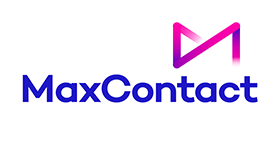 MaxContact is customer engagement software that goes above and beyond to build smarter customer experiences. Our platform is packed with powerful features, accessible for businesses large and small, and ensures organisations can operate compliantly.
MaxContact is customer engagement software that goes above and beyond to build smarter customer experiences. Our platform is packed with powerful features, accessible for businesses large and small, and ensures organisations can operate compliantly. 
